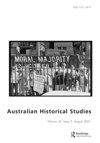爱尔兰世界的身份塑造:墨尔本和芝加哥,1830 - 1922
IF 0.6
3区 历史学
Q1 HISTORY
引用次数: 0
摘要
兰德斯,引发焦虑,甚至阴谋论。岛屿性不仅使我们能够更好地了解瓦杰姆普相对于大陆的位置,而且使我们能够更好地了解与印度洋及其他岛屿相连的世界其他地区的位置。这本书将吸引澳大利亚和全球的读者,包括研究帝国、惩罚、性别、移民和世界大战的历史学家,以及土著和岛屿研究的学者。它写得非常好,作为一个单一的叙述,它的连贯性非常好,尽管每一章都可以独立存在。值得注意的是,虽然这本书简单地涵盖了该岛的“深刻历史”,但其章节的重点是(后)殖民时期,大部分内容都涵盖了19世纪该岛作为监狱运作的时期。在1838年至1931年期间,有3700名土著男子和男孩被关押在这个岛上,其中十分之一的人丧生,使其成为该州最大的拘留死亡地点,因此这种关注是合理的。自1991年皇家委员会承诺改革以来,30年来已有540名土著囚犯在监禁期间死亡,这在今天引起了强烈的共鸣。因此,这本书在提高人们对Wadjemup/Rottnest在帝国主义和侵略史上的重要性的认识方面发挥了至关重要的作用,让更广泛的全球读者认识到这一点。本文章由计算机程序翻译,如有差异,请以英文原文为准。
Forging Identities in the Irish World: Melbourne and Chicago, c.1830–1922
landers, generating anxieties and even conspiracy theories. Insularity enables not only a better understanding of Wadjemup’s position in relation to the mainland, but in relation to the rest of the world, connected to islands in the Indian Ocean and beyond. The book will appeal to Australian and global audiences, including historians of empire, punishment, gender, migration, and the world wars, as well as to scholars of Indigenous and island studies. It is exceptionally well written, and coheres remarkably well as a single narrative, though each chapter can stand alone. It is worth noting that although the book briefly covers the ‘deep history’ of the island, its chapters are (post)colonial in focus, and the majority cover the nineteenth century when the island operated as a prison. This focus is justified by the importance of the island where 3,700 Aboriginal men and boys were confined between 1838 and 1931 and where one in ten lost their lives, making it the state’s largest site of deaths in custody. This has powerful resonance today when 540 Indigenous prisoners have died in custody in three decades since the 1991 Royal Commission promised change. This book therefore plays a crucial role in raising awareness of Wadjemup/Rottnest’s importance to histories of imperialism and invasion, to a wider, global audience.
求助全文
通过发布文献求助,成功后即可免费获取论文全文。
去求助
来源期刊

AUSTRALIAN HISTORICAL STUDIES
HISTORY-
CiteScore
0.70
自引率
16.70%
发文量
86
期刊介绍:
Australian Historical Studies is a refereed journal dealing with Australian, New Zealand and Pacific regional issues. The journal is concerned with aspects of the Australian past in all its forms: heritage and conservation, archaeology, visual display in museums and galleries, oral history, family history, and histories of place. It is published in March, June and September each year.
 求助内容:
求助内容: 应助结果提醒方式:
应助结果提醒方式:


